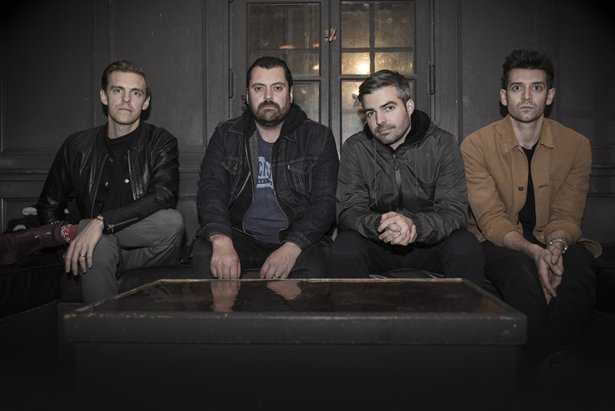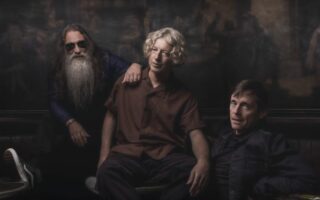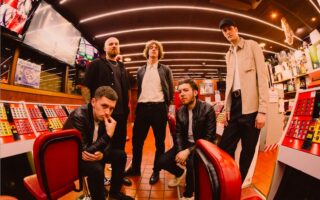
The Boxer Rebellion interview by Live4ever in New York (Photo: Paul Bachmann)
After nearly two decades in the music industry, The Boxer Rebellion have experienced pretty much everything it has to offer.
Reflecting on the almost universally positive reception earned by their most recent album Ghost Alive, about to feature prominently in Live4ever’s End Of Year countdown, we caught up recently with Nathan, Andrew, Adam and Piers in Manhattan to reflect with them on the creative process, Britpop and how the game has changed for up and coming artists.
Seventeen years is a long time…
Piers: It’s actually 18 years since I met Adam at music college. If we’d have had a child at that moment it would’ve been a young adult by now. I think in some respects the thing we’re really aware of though is that we’re a bit ‘old”’ for a band. Of course, you’ve got groups like The National and Elbow but at our level, there’s definitely a sense that we’ve been operating for a long time.
You’ve been down and up.
Piers: Most of our success has been defined by, if you like, ‘non-traditional’ measures. For instance, we’ve had what people would call traditional success in Holland, where we had a couple of songs which got very good radio play and we ended up pretty high on some festival bills. We’ve also had our music featured in films and on TV. Some people see us playing small to medium-sized rooms in, for instance America though and probably wonder how we sustain ourselves as a business, but it’s because of those other things that we’re still able to do shows like that. And it’s something that we love and we want to continue doing.
Andrew: We look sometimes at other bands – who we shan’t name – and think ‘wow, they’re still doing this’, but the truth is we’re well beyond caring about being hip now. We just want to to be good.
Piers: First priority now is about being good, but also being constantly relevant. You can also judge success in all kinds of ways. I know, for instance, so many people who look up to us, bands who appreciate just how well we’ve done. It would be just as easy, alternatively, for us to view other acts and compare up but I suppose you can have completely alternative outlooks: one that we’ve managed to survive the massive changes in music and played all over the world, or you can think ‘well, we never quite got to the great heights we dreamed of’.
Nathan: You also gauge it with stuff like ‘what would’ve I considered success as an 18-year-old’. The times like playing Letterman and The Tonight Show, things we’ve done that when I was that age you definitely saw as really cool stuff, we’ve actually fulfilled that ambition.
When you started you had this love affair with Britpop.
Piers: I was a big Blur fan and Nathan was a big Oasis fan, so we had it covered.
Is that still here, or…
Piers: I still listen to a bunch of stuff from that scene but I don’t now appreciate all the crap that came with it that was nothing to do with music. For years and years I haven’t been into a scene – for me if it’s good, it’s good. I remember reading about the last time Blur visited the Radio 1 building and Damon Albarn was telling people ‘we’re the oldest people here’; it’s a whole new culture now, totally different. Artists have to be so switched on at such a young age and they’re not going blindly at it so they burn out at 30. When Blur started out they were young, fresh, and talented, but they didn’t have a clue what they were doing. That’s the difference now.
Are there any bands we should have on our radar?
Andrew: Boy Azooga is kind of cool and exciting, they’re from Wales.
You talk to bands like Shame and they’ll say ‘in parts of London, these bands are hot’.
Andrew: It’s great that you can break it down to a specific place. One guy I’ve been listening to is Steven Steinbrink, a singer-songwriter from San Franciso who wrote a really powerful album about the Ghost Ship club fire a couple of years ago.
Nathan: Unlike Shame and those other bands. we’re not part of that just-starting-out gig circuit.
Piers: When we were starting out we used to hang around in Camden a bit and caught things randomly just because it was such a scene. There’s probably now half those venues still open – you don’t fall onto things as it was possible to do then, and part of that means you have to research, trawl through Spotify playlists and so on.
Nathan: There are almost too many underground blogs to follow, but they may introduce you to something.
Piers: We’ve noticed that there’s also more pressure for artists to create music and make it available instead of doing gigs. People will look at their streaming stats and make a call on how well they’re doing, where the numbers at the beginning for us were about how many people were coming through the doors to see you play.
Alan McGee said a while ago that if Oasis came out today they’d have been so much bigger because of social media, but Noel Gallagher says completely the opposite.
Piers: One thing that’s gone is that whole element of excitement you got from buying the NME and waiting for information, not knowing everything about everyone. I had it with Nirvana; they were so mysterious, if I was lucky I got to discover what was happening with Kurt and all the other bands I liked in a magazine. With platforms like Instagram all the intrigue’s gone, you can hear and see everything about someone. The last great band who were able to maintain their mystique was Nirvana. You’re a music fan before you’re a musician. I told myself when I was younger to prove that I’d buy the NME, go to Glastonbury every year and buy 2 or 3 records a week, now there’s almost no print music press, Glastonbury’s sold out in 20 minutes and you just listen to music online.
Nathan: I loved it when record stores in Notting Hill had all the promos. I used to get a few of them based purely off the name of the band. Now you don’t really approach music that way.
Piers: As soon as someone tells me to check something out, I’m doing it in 20 seconds.
Nathan. Yeah! Then you can judge whether you like it in 30 seconds and within a minute, you’ve done it all. In the past you used to wait a week to buy a record, take it home and then spend time getting used to it.
Piers: It can all be over in three songs – and that’s the way you now structure an album.
Speaking of albums, was Ghost Alive vocally your most challenging Nate? You’re up in the high register for quite a lot of it.
Nathan: Not like you might think. Parts of Ocean By Ocean were probably harder to do but it’s the early stuff, Exits era, that are really tough for me to sing now because back then I used to shout a lot more.
Piers: On some of the songs that combination of falsetto and loud instrumentation, making yourself heard and getting it right is quite a battle.
It’s a very personal and emotional record. How did it feel like for the rest of the band when Nathan was writing these kind of songs?
Piers: Not as you may imagine. Andrew took a huge role in crafting the sound we wanted through the string and horn arrangements. The songs that came together were a mixture; some a few years old, some more recent, some we’d written as a band, some Nathan had written on his own. We wanted to create a ‘softer’ record. Andrew is more classically trained and did the arrangements, we went with Cecil who works with Flood and he brought it together, mostly in one room. The instruments and textures you put around certain songs and lyrics brings a certain balance.
Nathan: For me, it’s a really cohesive album. When you’re building records you don’t usually go back and try and frame them as much; having Andy look at it as a picture and scale back some elements meant you could redirect the energy back to the same place.
Andrew: There might not be a place for synths and drum machines so much when you’re in a certain mood, but we’re almost programmed from when we were young for orchestral music to really get to the heart – strings to convey things to you, so just having the presence of violins, cellos etc tend to push you in a certain direction emotionally.
Piers: I’m happy that you can’t just make a decision about it based on hearing 20 seconds. When people were hearing the songs from it for the first time at our shows we recognised that it’s hard to accurately reproduce a record like Ghost Alive, because we don’t have the instrumentation. But people have faith in us as a band to go and buy it anyway, which is kind of an old school approach which was really exciting for us.
Finally, are you thinking yet about a new album?
Piers: We’re always thinking about new songs, but an album is quite daunting in an environment where it’s so much effort for relatively little reward. It’s been over the period of making the last two or three that things have definitely changed. You work really hard to create one and then campaign-wise it comes out, and then just like that it’s over. People even drop releases now without telling you, there’s no anticipation, there’s no build-up and it’s very hard for albums to exist that way. It’s pretty unhealthy for bands of our size to put so much into them.
We’ll keep writing songs, and eventually they might be an album. We’ll keep feeding the machine.



